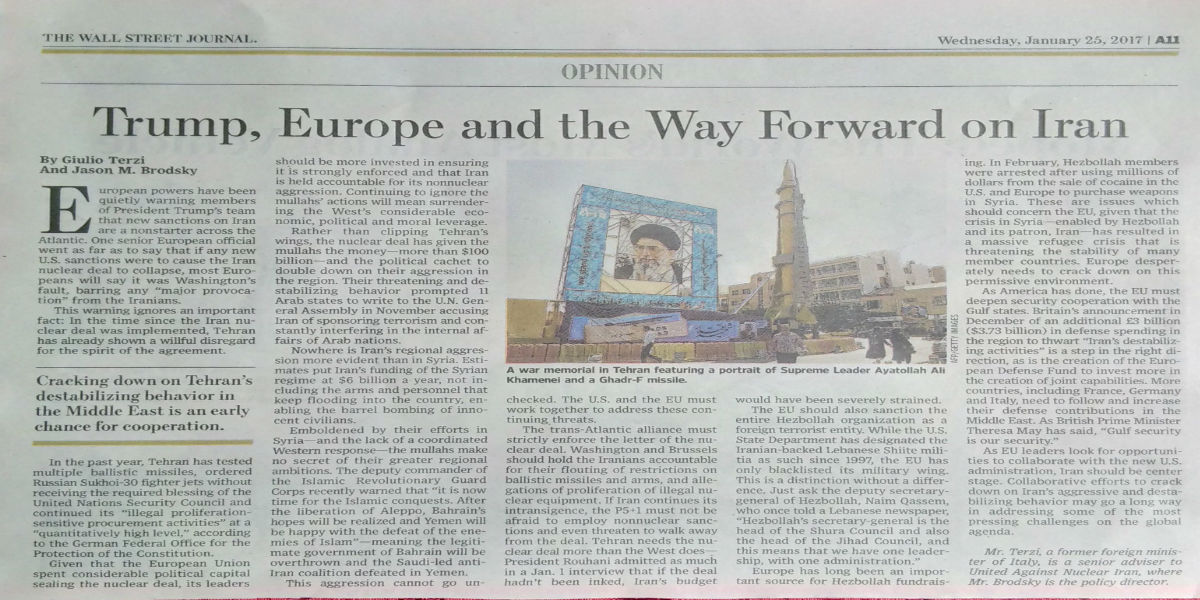Giulio Terzi e Jason M. Brodsky
European powers have been quietly warning members of President Trump’s team that new sancrions on Iran are a nonstarter across the atlantic. One senior European official went as far as to say that if any new us sanctions were to cause the Iran nuclear deal to collapse, most Europeans will say it was Washington’s fault, barring any “major provocation” from the Iranians.
This warning ignores an important fact: in the stime since the Iran nuclear deal was implemented, Tehran has already shown a willful disregard for the spirit of the agreement.
In tthe past year, Tehran has tested multiple ballistic missiles, ordered Russian Sokhoi-30 fighter jets without receiving the required blessing of the United Nations Security Council and countinued its “illegal proliferation-sensitive procurement activities” aat a quantitatively high level”, according to the German Federal Office for the PRotection of the Constitution.
Given that the European Union spent considerable political capital sealing the nuclear deal, its leaders should be more invested in ensuring it is strongly enforced and that iran is held accountable for its nonnuclear aggression. Continuing to ignore the mullah’s actions will mean surrendering the West’s considerable economic, political and moral leverage.
Rather than clipping Tehran’s wings, the nuclear deal has given the mullahs the money – more than 100$ billion- and the political cachet to double down on their aggression in the region. Their threatening and destabilizing behavior prompted 11 Arab states to write to the U.N. General Assembly in Novembre accusing Iran of sponsoring terrorism and constantly interfering in the internal affair of Arab nations.
Nowhere is Iran’s regional aggression more evident than in Syria. Estimates put Iran’s funding of the Syrian regime at 6$ billion a year, not including the arms and personnel that keep flooding into the country, enabling the barrel bombing of innocent civilians.
Emboldened by their efforts in Syria – and the lack of a coordinated Western response- the mullahs make no secret of their greater regional ambitions. The deputy commander of the Islamic Revolutionary Guard Corps recently warned that “it is now time ofr the Islamic conquests. After the liberation of Aleppo, Bahrain’s hopes will be realized and Yemen will be happy with the defeat of the enemies of Islam” – meaning the legitimate government of Bahrian will be overhtrown and the Saudi-led anti-Iran coalition defeated in Yemen.
This aggression cannot go unchecked. The U.S. and the EU must work together to address these continuing threats.
The trans-Atlantic alliance must strictly enforce the letter of the nuclear deal. Washington and Brussels should hold the Iranians accountable for their flouting of restrictions on ballistic missiles and arms, and allegations of proliferation of illegal nuclear equipment. If Iran ccontinues its intransigence, the P5+1 must not be afraid to employ nonnuclear sanctions and even threaten to walk away from the deal. Tehran needs the nuclear deal more than the West does – President Rouhani admitted as much in a Jan. 1 interview that if the deal hadn’t been inked, Iran’s budget would have been severely strained. The EU should also sanction the entire Hezbollah organization as a foreign terrorist entity. While the U.S: State Department has designated the Iranian-backed Lebanese Shiite militia as such since 1997, the EU has oly blacklisted its military wing. This is a distinction without a difference. Just ask the deputy secretary general of Hezbollah, Naim Qassem, who once told a Lebanese newspaper, “Hezbollah’s secretary-general is the head of the Shura Council and also the head of the Jihas Council, and this means that we have one leadership, with one administration”.
Europe has long been an important source for Hezbollah fundraising. In February, Hezbollah members were arrested after using millions of dollars from the sale of cocaine in the U.S. and Europe to purchase weapons in Syria. These are issues which should concern the EU, given that the crisis in Syria – enabled by Hezbollah and its patron, Iran – has resulted in a massive refugee crisis that is threatening the stability of many member countries. Europe desperately needs to crack down on this permissive environment.
As America has done the Eu must deepen security cooperation with the Gulf states. Britain’s announcement in December of an additional £3 billion ($3.73) in defense spending in the region to thwart “Iran’s destabilizing activities” is a step in the right direction, as is the creation of the European Defense Fund to invest more in the creation of joint capabilities, More countries, including France, Germany and Italy, need to followe and increase their defense contributions in the Middle East. As British Prime Minister Theresa May has Said, “Gulf security is our security”.
As EU leaders look for opportunities to collaborate with the new U.S. administration, Iran should be center stage. Collaborative efforts to crack down on Iran’s aggressive and destabilizing behavior may go a long way in addressing some of the most pressing challenges on the global agenda.

